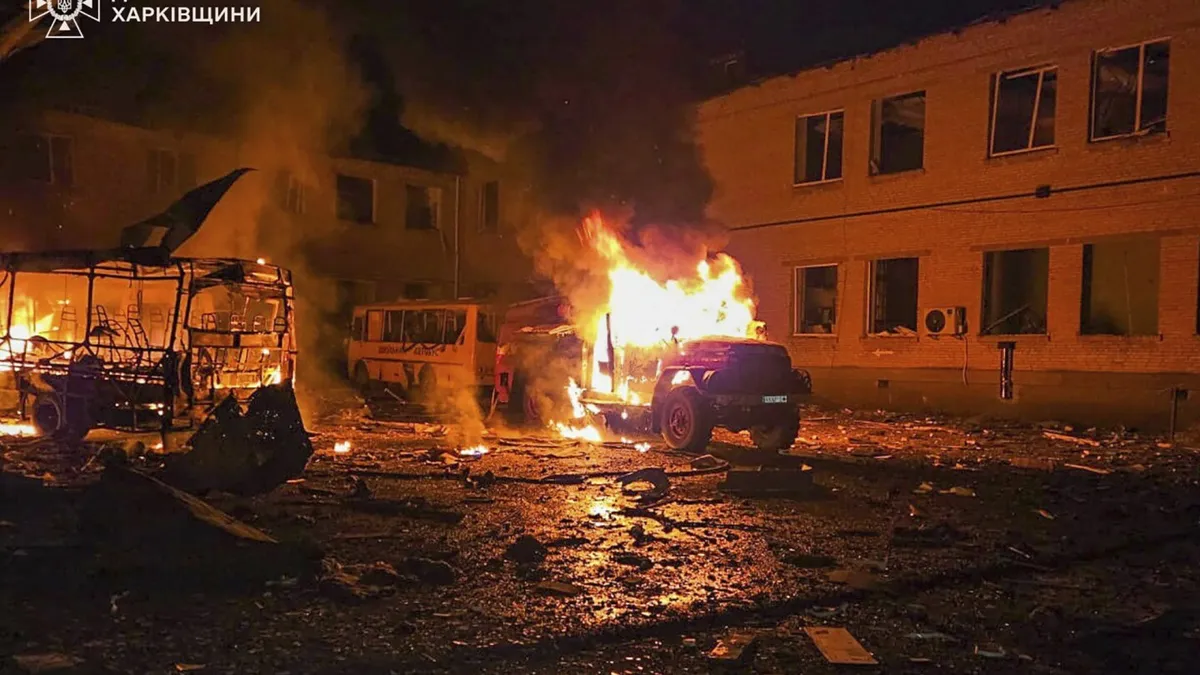
In a dramatic escalation of hostilities, Russia and Ukraine exchanged heavy aerial strikes overnight, with both nations reporting over 100 enemy drones over their territories on Saturday. This surge in attacks comes just a day after Russian President Vladimir Putin held discussions with U.S. envoy Steve Witkoff regarding a proposed 30-day ceasefire aimed at ending the ongoing conflict in Ukraine.
During a press conference on Thursday, Putin expressed his support for a truce in principle; however, he outlined numerous conditions that need to be addressed before a formal agreement can be reached. Meanwhile, Kyiv has already shown its support for this ceasefire proposal, although Ukrainian officials have voiced skepticism regarding Moscow's willingness to adhere to such a deal.
On Saturday, following virtual discussions among Western allies led by U.K. Prime Minister Keir Starmer, Ukrainian President Volodymyr Zelenskyy reaffirmed Ukraine's backing for the 30-day ceasefire proposal. He emphasized the need for negotiations to pave the way for a more comprehensive peace plan. However, Zelenskyy warned that Russia would likely try to complicate the discussions with additional demands and conditions.
Starmer urged allied nations to maintain pressure on Putin to accept the ceasefire, positioning Ukraine as the “party of peace.” He expressed confidence that Putin would eventually have to engage in meaningful dialogue. Zelenskyy also highlighted concerns about Russia's military buildup along the border, indicating that Moscow appears disinterested in diplomatic resolutions and is intent on prolonging the conflict.
If Russia rejects the U.S. ceasefire proposal, Zelenskyy warned of a potential “specific, harsh and straightforward” response from the administration of U.S. President Donald Trump. He reassured that Ukrainian forces are actively maintaining their positions in Russia’s Kursk region despite claims that they were encircled by Russian troops. “Our troops continue to hold back Russian and North Korean groupings in the Kursk region. There is no encirclement of our troops,” Zelenskyy stated.
U.S. Secretary of State Marco Rubio engaged in discussions with Russian Foreign Minister Sergei Lavrov on Saturday, focusing on the next steps following recent meetings in Saudi Arabia. They agreed on the importance of restoring communication channels between the United States and Russia, as highlighted by State Department spokesperson Tammy Bruce.
Ukraine’s air force reported that Russia launched a significant assault, deploying 178 drones and two ballistic missiles overnight. The offensive featured a combination of Shahed-type drones and decoy drones intended to confuse Ukraine's air defense systems. Ukrainian forces successfully shot down approximately 130 drones, while 38 others failed to hit their intended targets.
Russia's drone strikes primarily targeted energy infrastructure, inflicting considerable damage especially in the Dnipropetrovsk and Odesa regions, according to a statement from Ukraine’s private energy company, DTEK. The assault left numerous residents without electricity. “The damage is significant. Energy workers are already working on the ground. We are doing everything possible to restore power to homes as soon as possible,” the energy firm reported.
In a related incident, falling drone debris in Russia’s Volgograd region ignited a fire in the Krasnoarmeysky district, near a Lukoil oil refinery, although local authorities reported no casualties. The Volgograd refinery has been a target for Kyiv's forces multiple times since the onset of Russia's full-scale invasion of Ukraine over three years ago. Notably, the refinery faced a drone attack as recently as February 15.
As the situation continues to evolve, both nations remain locked in a cycle of conflict, with international diplomatic efforts striving to achieve a sustainable resolution.